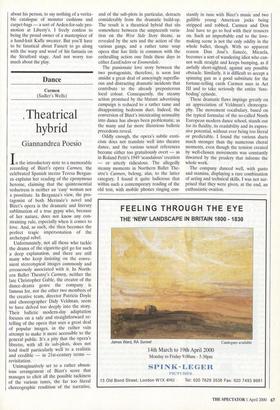Theatre 2
As You Like It
(Royal Shakespeare Theatre, Stratford)
Verbal magic
Patrick Carnegy
Never is the theatre at greater risk than when it hopes to import a touch of glamour by co-opting a couturier. At the Royal Opera House, Versace's costumes for Capriccio and Arrnani's for Cosi fan tutte were indiscretions that were fatal to the business in hand. The couturiers had better music, if not always better bodies, to show off their collections, but it's all up with the stage when it's leased out as a cat- walk.
That I should find myself having to talk first about Kaffe Fassett's costumes and accoutrements for the RSC's new As You Like It is already a sign that something is awry. Gregory Doran is its director and his stagings of The Winter's Tale, Oroonoko, Timon of Athens and Macbeth over the past year have all been outstanding. But take away Fassett's coat of many colours and the production stands lost in a threadbare shift. Ever resourceful in mining humour from tragedy, Doran seems at a loss to fathom the deeper currents in this pastoral comedy. In truth, As You Like It is one of the toughest of Shakespeare's comedies to stage because its improbabilities and exu- berant artifice are no more than pretexts for the verbal magic of its disparate loving couples, the highborn Rosalind and Orlan- do, set against the rather less spiritual cou- pling of Touchstone and Audrey.
Alexandra Gilbreath's Rosalind begins well enough with a troubled, care-worn look that is true to her situation — mourn- ing her father's banishment, her life at the usurping Duke's court bearable only because of Celia's friendship. Until, that is, she catches sight of Orlando and her father is quite forgot. This infatuation is followed all too swiftly by her own banishment to the Forest of Arden and the charade she devises to make proof of Orlando's love once he's followed her there. Like all Ros- alinds of quality, Gilbreath has fun with this, but her stable-laddish `Ganymede' is too busily putting on the style to feel the Mozartean pain-in-joy that must be there if the character is to move as well as enter- tain. Certainly she has good moments, especially when she finds herself perilously caught out between playing ‘Ganymede' and being Rosalind, but not enough to restore the androgynous allure thrown away by swaggering around with her thumbs in the pockets of her knee-breeches and veiling her voice with a breathy, some- times almost panting style of delivery. No wonder Nancy Carroll's winsome Celia buries her head in her book.
It doesn't help that Anthony Howell, making his RSC debut with Orlando, has so little of the character's impulsive sexuali- ty — this being the very reason why Ros- alind has to invent Ganymede's love-cure so she can nurture it to their mutual advan- tage. Maybe this is only another way of say- ing that the essential sexual chemistry between the two actors was never really there — as it so memorably was with Victo- ria Hamilton and Ben Daniels in Michael Grandage's Sheffield production which I recently caught at the Lyric Hammersmith. Here, the sense of joie de vivre played out in the thickets of adversity could scarcely have been more winning, if at the price of casting too much of the text to the winds in rapid-fire delivery.
Not so at Stratford, where Adrian Schiller almost rescued the show by having you listen to Touchstone's every word and making uncommon sense of them into the bargain. It was a real treat to see him work- ing himself up into a dastardly frenzy against the peasant William (Gavin Abbott) only to swoon in terror as the harmless giant clears his throat before attempting a response. This was pure gain, but it remains incomprehensible why Declan Conlon should have made Jaques such a flat and lifeless figure. In his defence it can be said that he couldn't have sucked even the least drop of melancholy from the abysmally insensitive music pro- vided by Django Bates and tunelessly belt- ed out on the stage. (At the Lyric the a cappella singing had been quite perfect.) The only pleasure to be found in this Jaques is that in his floor-length dark coat he was the sole figure to escape being knitted-out in camp Kaffe.
The backdrop when the play begins is an unassertive tapestry and you are charmed to see Rosalind and Celia in exquisitely pretty black-and-white dresses. An enrich- ing denial of obvious expectation, perhaps promising a gradual infiltration of colour as the drama, in its upward path from winter chill to the light and life of spring, unfolds. But no, once we're in the forest there isn't (apart from Jaques) a courtier or peasant without some multi-coloured textile twined
about his person, to say nothing of a verita- ble catalogue of monster cushions and carpet-bags — a sort of Arden-for-sale pro- motion at Liberty's. I freely confess to being the proud owner of a masterpiece of a hand-knit Kaffe sweater. But you'll have to be fanatical about Fassett to go along with the warp and woof of his fantasia on the Stratford stage. And not worry too much about the play.























































































 Previous page
Previous page